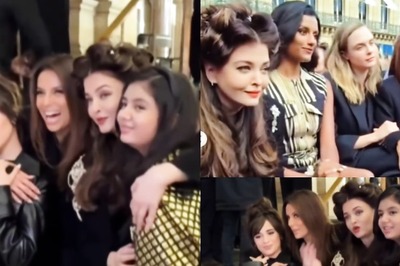
views
Dordle, Quordle, Octordle, and Sedecordle
In these versions of Wordle, you solve for multiple words at once. Many Wordle spin-off games give players an added challenge by upping the number of secret, five-letter words you’re solving for. Dordle is double the Wordle—so, you guess two words in seven tries. Merriam-Webster’s Quordle is quadruple the Wordle, making you solve for four words in nine tries. Octordle challenges you to figure out eight words in 13 tries. Finally, in mega-puzzle Sedecordle, you have 21 tries to guess 16 words. These games’ formats are similar to Wordle. Enter a guess by typing a five-letter word. After you submit your guess (by pressing enter), the word grid will change colors to give you hints. A green square in the grid means that letter is in the right place in the secret word. A yellow square means the letter is in the secret word, but in the wrong place. No color or a gray color means the letter is not in that secret word. Remember, some letters can appear twice!
Thirdle
Thirdle challenges you to solve for three interconnected words. It looks like a crossword puzzle, but uses Wordle’s letter-guessing format instead of themed clues. Thirdle starts you off with two correct letters in green, and you have six tries to guess all three secret words correctly. To play, type three guess words, paying attention to where the words intersect. Hit “Enter” to submit your guesses. A mini image of your puzzle will appear at the top, with each letter tile changing colors to help you make your next guess. Green tiles mean the letter is in the right place. Orange tiles mean the letter is in the right word but the wrong place. Purple tiles mean the letter is in the wrong word. Black tiles mean the letter is not in any of the words.
Crosswordle
Crosswordle is a word scramble combined with a crossword. The puzzle challenges you to swap letters into the correct positions to spell several words of different lengths. Since the letters are already on the puzzle in Crosswordle, you have to use their tile colors to help you solve for the secret words. Try to solve in as few swaps as you can! A green tile means that letter is in the right place and can’t be swapped. A yellow tile means that letter is in the correct word (horizontal or vertical) but the wrong position. Gray letters are in a different word. For each remaining swap at the end of the puzzle, you earn one star. Try to use as few swaps as possible to get letters in the correct words and places.
Squareword
Squareword lets you play Wordle in two dimensions at once. You guess five-letter words to reveal letters on a 5x5 square of 10 words (five across and five down). You have unlimited guesses in Squareword, although a target amount of guesses is listed at the top. Like Wordle, there’s a new puzzle every day. Start the game by typing in a five-letter word and pressing “Enter.” Letters that are in the correct space in the 5x5 grid will turn green. Letters that are in the correct (across) word, but not in the right space, will appear in the yellow spaces on the right side of the grid. Letters that aren’t in the grid at all will turn gray on the keyboard at the bottom. Think of which words can be spelled with the letters in the yellow squares to refine your guesses. Be sure to consider which words are being spelled down as well as across!
hello wordl
hello wordl is like Wordle if it were customizable. The game lets you use a slider before you start to toggle the length of the secret word. You can guess a four-letter word or try your luck with an 11-letter secret word. You can also adjust the difficulty between “Normal,” “Hard,” and “Ultra Hard.” Play hello wordl the same way you’d play Wordle. Type in your word and press “Enter” to submit a guess. A yellow tile means the letter is in the secret word, but in the wrong position. A green tile means the letter is in the secret word and in the right position. A gray tile means the letter is not in the secret word. In “Hard” mode, green letters must stay fixed and yellow letters must be reused in subsequent guesses. In “Ultra Hard” mode, yellow letters must be reused in a different position in your guess, and gray letters cannot be reused. Talk about a challenge!
Waffle
Waffle is a word scramble that challenges you to solve several interconnected words. It looks like the grid of a waffle—hence, the breakfast-inspired name. Unlike Crosswordle, in Waffle, you have a limited amount of swaps (15) to use to solve the puzzle. Each puzzle can be solved in a minimum of 10 moves. To play Waffle, rearrange the letters in the grid to solve for all the correct words. Letter tiles that are green indicate a letter is in the right place. Letter tiles that are yellow indicate the letter is in the right word but the wrong place.
Absurdle
In Absurdle, the game’s difficulty increases with each guess. When you start playing, there’s no secret word to guess. Instead, the Absurdle algorithm picks a secret word that’s dissimilar from your guess. The secret word can change as you play, though the list of possible words will get smaller until there’s only one correct word left. Play by typing in five-letter word guesses. Tiles will turn black if the letter isn’t in the word, yellow if the letter is in the word but not in the right space, and green if the letter is in the right space. There’s no limit to how many guesses you get—or the game would be nearly impossible! However, the best possible score is 4 guesses.
Antiwordle
Antiwordle is like Wordle in reverse: you have to avoid guessing the secret word. Your challenge is to try to tailor your guesses to be uncommon five-letter words. When tiles turn yellow, you have to include them in your guesses—but you can try to put them in all the wrong spaces. New [ttps://www.antiwordle.com/ Antiwordle] puzzles arrive daily. Begin the game by entering a five-letter word. Tiles will turn gray if their letters aren’t in the word—and they can’t be used again. Tiles will turn yellow if their letters are in the word but in the wrong place. You have to reuse those letters in your next guess. Tiles will turn red and lock into place if they are in the right place. The more guesses you can make before solving, the better your score.
Semantle
In Semantle, you must guess a secret word based on your guesses’ semantic similarity. Semantics refer to a word’s meaning. The game uses artificial intelligence to calculate words’ meanings and assigns semantic distances between words—a shorter distance means more closely related words. Use your guesses’ similarity scores to help you guess the secret word. To play, type a word of any length and press “Guess.” You’ll see a similarity score and a proximity label. At the top of the screen, the game tells you the similarity scores of the nearest words. The proximity labels appear next to each guess. These give you a temperature or distance to let you know how close the word is (for example, far, cold, tepid) until you’re within 1000 words—then they tell you the guess’s proximity to the secret word out of 1000. You have unlimited guesses. Use the similarity scores and proximity labels to refine your guesses to be more closely related to the secret word. For example, say the secret word is “harmony.” A guess like “melody” has a similarity score of 41.49 and a proximity label of 941/1000. A guess like “bacon,” which has little meaning in common with harmony, has a similarity score of 7.14 and a proximity label of “cold.”
Pixletters
Pixletters gives you visual clues instead of letter-based hints. Like in Wordle, you try to guess a five-letter word—but in Pixletters, you only have five tries instead of six. When you make a guess, each letter you type is pixelated. The top row of pixels changes colors to indicate if a pixel (or the correct letter) is in the right spot. Start by typing in a five-letter word. After each guess, pixels will turn one of four colors. A correct letter will appear with all its pixels turned blue. For incorrect letters, pixels from the top row will turn green if they appear in the correct letter for that space, or red if they do not appear in the correct letter for that space. Pixels from other rows will be gray and may or may not be in the correct letter.
Heardle
Heardle is like Wordle for music lovers. This game tasks you to identify a correct song after hearing just a snippet of its intro. You can unlock more of the intro as you play, but the goal is to identify the correct song in as few tries as possible. Before starting the game, make sure your volume is up on your device so you can hear the songs being played. To play, click the play icon at the bottom of the game. Listen to the brief snippet of the secret song’s intro. Then, type the title of the song you think the intro is from and click “Submit” to enter your guess. If your guess is incorrect, you’ll unlock more of the intro. Or, press “Skip” to get an additional second of the song to help you make a guess.
Artle
Test your art-world knowledge with Artle. The museum-themed version of Wordle comes from the National Gallery of Art. In each daily Artle puzzle, you’re shown four works of art from a different museum’s collections. The goal: guess the artist before four attempts are up. To play, start by viewing the first artwork and making a guess by typing an artist’s name into the search field and clicking “Submit.” A red ‘X’ will appear if the guess is incorrect, or you’ll win the game if your guess is correct. If your guess is incorrect, view the second, third, or fourth artwork and try again.
Nerdle
Nerdle turns Wordle into a math game. Instead of uncovering a secret word in six tries, you solve for a hidden calculation that is equal on both sides of the = sign. You don’t have to be a math genius to play Nerdle—the equations are simply combinations of numbers 1-9 and +,-,/, or * symbols that you solve according to the order of operations. Begin playing by typing in an equation with any combination of the numbers and symbols. Add an equal sign and the solution to the equation you made. You have eight spaces to enter your entire equation. Then, hit “Enter” to check your guess. Tiles will turn green if a number or symbol is in the right place, magenta if the number is in the equation but in the wrong place, and black if the number is not in the solution at all. If your guess includes two numbers but only one is in the secret equation, one of those numbers’ tiles will turn black while the other will turn magenta. Commutative answers are automatically enabled in settings. This means if the secret equation is 10+20=30, 20+10=30 will be accepted, too.
Phoodle
Foodie fans will enjoy Phoodle, a food-themed take on Wordle. Like Wordle, you have six tries to guess a five-letter word—but every secret word is somehow related to food. Whether or not you solve the puzzle correctly, you get a fun Phoodle Fact about a culinary topic. New Phoodle puzzles appear daily. Play Phoodle by typing a food related word and hitting “Enter” on your keyboard. After each guess, tiles will change color to reveal if their letter is in the secret word or not. A green tile means the letter is in the right spot, a yellow tile means the letter is in the word but in the wrong spot, and a gray tile means the letter is not in the secret word. The correct word could be an ingredient, a kitchen gadget, a cooking technique, or another food-related term—get creative when thinking of guesses.
Hollywoodle
Hollywoodle challenges you to connect two actors via films they each starred in. The fewer films and actors you use to connect them, the better your score. You may recall this game as similar to the “Six Degrees of Kevin Bacon” game from the ‘90s, but with a Wordle-inspired format. At the start of the game, you’re shown the names and pictures of two actors. You have to connect the first actor to the second actor. Start by trying to name a film both actors appeared in. If you can’t, guess a movie starring the first actor and a cast member who’s made a movie with the second actor. Guess that cast member—that’s now the actor whose films you’re trying to connect to the original second actor with another film (or film and cast member). Correct guesses gain you one move (1 point). Incorrect guesses—either a movie that the current actor didn’t appear in, or an actor who wasn’t in the current movie—gain you three moves (3 points). A hint will gain you one move (1 point). A movie guess that only includes the second actor gives you two moves (2 points). The best possible score is one move/1 point.
Wizarding Wordle
Wizarding Wordle is a Wordle-like game themed around the Harry Potter franchise. The game is hosted on the franchise’s official website, mugglenet.com. The gameplay is similar to Wordle: you have six tries to guess a five-letter word. The twist: the secret word is related to the Wizarding World in some way, whether it’s a character, place, spell, or other reference. To play, type a five-letter, Harry Potter-related word and press “Enter.” Tiles will change colors after your guess to show how accurate it is. A green tile tells you the letter is in the secret word and in the right place. A yellow tile tells you the letter is in the secret word, but in the wrong place. A gray tile tells you the letter is not in the word in any place.
Tradle
Tradle is the perfect game for Wordle fans who study trade data. Using data from The Observatory of Economic Complexity, the game generates a treemap of a secret country’s exports. You must use the export information to guess a country or territory until you match the exports to the right place of origin—within six guesses. To play, study the treemap of exports and consider which countries or territories it may represent. The treemap is made of rectangles representing a product, with each rectangle’s size proportional to the percentage of that product’s exports. After a guess, you will be given the distance (in kilometers), direction (as an arrow emoji), and proximity (as a percentage) of your guessed location from the correct country. A new puzzle arrives daily.
Lewdle and Sweardle
Lewdle and Sweardle are like Wordle with obscenities. As the games’ names suggest, the secret words you’re trying to guess are lewd words or swears. Lewdle and Sweardle are not safe for playing at work (nor meant for younger players), but offer adult takes on the classic word game. Sweardle prompts you to guess four-letter words, while Lewdle includes five-letter words. To play Lewdle, type a five-letter word and hit “Enter.” After each guess, the tiles will change colors to show which letters are in the right or wrong place. A green tile means the letter is in the secret word and the right position. A yellow tile means the letter is in the secret word but in the wrong position. A gray tile means the letter is not in the secret word. You have six tries to guess. To play Sweardle, type a four-letter swear word and hit “Enter.” After your guess, the letters will be marked in green if they are in the right place, yellow if they are in the word but in the wrong place, and gray if they’re not in the word. You get four chances to guess correctly.
Other NYT Games
The New York Times has other word games besides Wordle. Once you’ve played your daily game of Wordle, try out Spelling Bee, Strands, and Connections. Each has a unique format that requires you to draw upon your vocabulary and word-grouping skills. Spelling Bee: In this game, you’re given a hive of seven letters to use to spell words. The middle space is yellow—you have to include this letter in your guesses. Guesses must be at least four letters long—no obscenities, hyphenated words, obscure words, or proper nouns. You can use letters multiple times in one word. Each puzzle has one “pangram” word that uses every letter in the hive. The goal: spell as many words as you can to rack up the most points. Strands: Strands is a twist on a word search game. Every letter on the board is part of a theme word (no overlap!) You can drag or tap letters to create words. There’s a “spangram” word describing the puzzle’s theme, which spans from one side of the board to the other and turns yellow when found. Theme words turn blue when found. Non-theme words can earn you hints—three non-theme words equals one hint. Find every theme word and the spangram to win! Connections: In Connections, you have to make four groups of four out of 16 words in a grid. Each group of four will have something in common. For example, the words ‘base,’ ‘down,’ ‘up,’ and ‘stone’ all come after the word ‘touch’ in different words or phrases. You guess a group by clicking on the four words you think are related and tapping “Submit.” The game will tell you if it’s incorrect. If you make four mistakes before solving for all four groups, you lose and the answers are revealed.


















Comments
0 comment